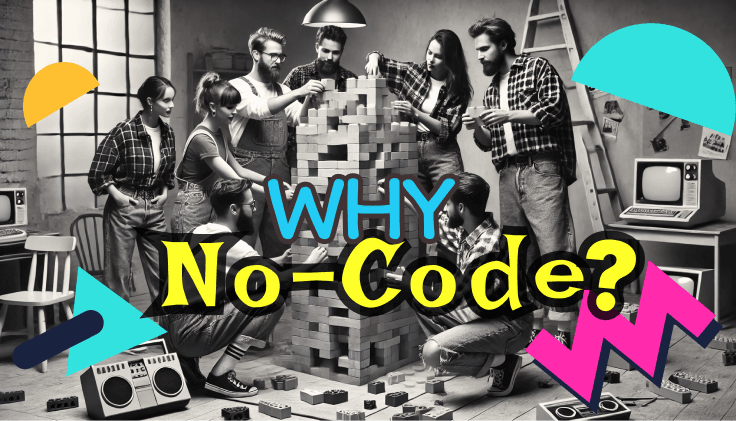1. introduction
All too often, I've seen applications that are long and costly to set up, then difficult to maintain, and which ultimately fail to achieve their stated objectives. Do you really want this for your teams? Are you wondering which technological solutions to choose? Navigating this sea of possibilities can be confusing. Here, we'll explore what Nocode has to offer compared to other solutions. We'll avoid diving into the technical details and focus instead on its added value.
So, what is Nocode? Simply put, it's a technology that democratizes application creation.
A Nocode solution enables anyone to transform ideas into concrete solutions, without the need for programming skills.
Tools such as Notion, Airtable, Canva, Make, Bubble, and of course Penco 😉 are among the most popular. Each has its own specialty and specific uses.
2. The power of Nocode: myth or reality?
Nocode is often perceived as a fast and cost-effective solution for developing applications. But is this really the case? Is it their only advantage? To better understand this ecosystem, let's classify Nocode applications into four categories:
- Interface creation / Software
- Automation
- Productivity / Collaboration
- Mono Functionality
A. Interface and software creation tools
These tools enable you to create simple or complex web sites and applications without programming. They require a certain amount of time to learn, and are intended for technical people. Tools: Bubble.io, Webflow, Glide, Adalo, Softr.
B. Automation tools
These tools automate tasks or processes, sometimes across several applications. For example, automate the addition of a new prospect to a CRM as soon as a contact form is filled in. Tools: Make, Zappier, n8n, IFTTT, Parabola.
C. Productivity / collaboration tools
For a long time, software imposed its own way of doing things on users. Today, thanks to Nocode, users can create productivity tools that adapt to their needs. Tools: Notion, Airtable, Monday, Coda, Penco.
D. Single-function tools
These tools meet specific needs, such as creating a form, launching a newsletter or opening an online store. They require no programming knowledge and are easy to customize. Tools: Typeform, Mailjet, Shopify, Trello, Canva.
As you can see, a Nocode application offers invaluable customization. Depending on the size and needs of your organization, you can create your own solutions or get help from experts.
Nocode solutions open up many new avenues, and above all, they can propel you to new heights of productivity!
3. Off-the-shelf versus Nocode
Off-the-shelf applications are often presented as ready-to-use (spoiler: this isn't always true). They pile on functionality to meet a variety of demands, but this often ends up detracting from the user experience. Nocode platforms, especially those categorized as “productivity and collaboration” platforms, offer customization that engages users more. Take Excel sheets, for example: powerful and flexible, but complicated and not very collaborative. In contrast, tools like Penco are simple, collaborative and customizable. If you have very specific needs, off-the-shelf solutions may be the best choice, such as Adobe for graphic designers or Salesforce for marketers. For all other needs, Nocode tools like Penco are undoubtedly suitable and very satisfying to use.
4. application example: knowledge management
Let's take a look at a concrete example: knowledge sharing in the workplace. Nocode, with tools such as Notion, enables the creation of personalized workspaces to facilitate knowledge sharing. Although off-the-shelf solutions can also be suitable, they often only meet a single need, forcing companies to accumulate different applications. This makes managing solutions cumbersome and complex. Penco, for example, addresses this problem by offering an all-in-one solution.
Any organization should not multiply software solutions, but rather reduce them.
5. Nocode: fad or solution for the future?
Let's look at the trends (period 2019-today):
- AI (artificial intelligence) is skyrocketing
- NFTs (Unique Digital Identifiers) had their moment of glory in 2022
- Cryptocurrencies remain stable with peaks in popularity
- Nocode is making steady progress.
Nocode is not a fad. Coupled with AI, it can significantly increase productivity.
6. Conclusion
Nocode is revolutionizing application creation. Tools like Notion, Penco and Airtable show that it's possible to create powerful, customized solutions without coding. Whether you're a company or a freelancer with an idea to bring to fruition, Nocode is an accessible and effective option.
In summary, choosing Nocode:
- Offers greater flexibility and adaptability than off-the-shelf solutions.
- Can replace almost any single-function tool: work organization, CRM, EDM, HRIS, project management, etc.
- Promotes user satisfaction by placing them at the heart of the system.

